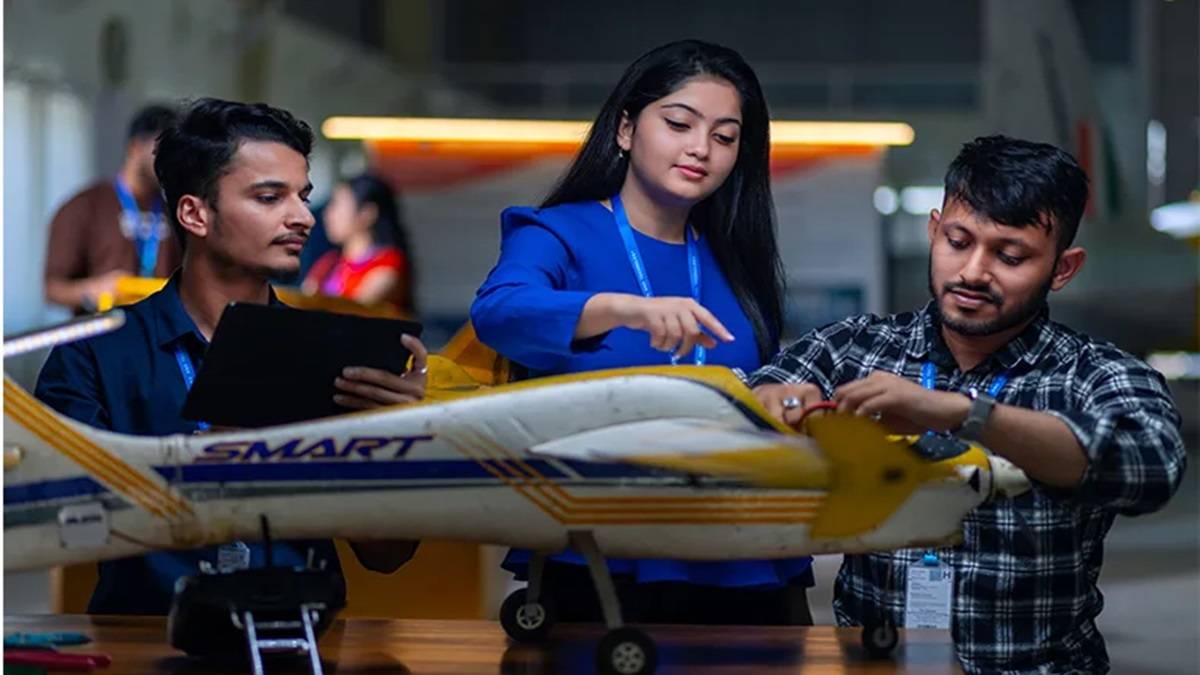The institutions/ organisations who hire the degree holders are Aerospace Manufacturers (HAL), Government Agencies (ISRO, DRDO, and the Indian Air Force), Airlines and Aviation Companies, Research and Development Institutions (that conduct research and development in aerospace), Consulting Firms etc.
The Indian aerospace industry is experiencing significant growth, driven by both the defense and civil aviation sectors, and is projected to reach around $70 billion by 2030. With this growth, the aerospace and the aviation sector would require more and more skilled manpower to design, develop, operate and maintain the aircraft, rotorcraft, rockets (launch vehicles), spacecraft, missiles, unmanned aerial vehicles (UAVs) and support systems including test facilities. These opportunities create huge job opportunities in both private and public sectors.
To become an aerospace engineer, a bachelor’s degree in aerospace/aeronautical engineering is required. Apart from that a strong foundation of STEM subjects like Mathematics, physics, and Chemistry is required. Students can pursue graduation, master's, or doctorate degrees in specialized fields such as aerospace engineering, aeronautical engineering, aerodynamic engineering, aerospace structures and design engineering, aerospace propulsion and many more courses for research and other advanced roles in the domain.
The field also includes roles in areas like maintenance, quality control, and project management. Furthermore, with increasing breakthrough and innovations in areas like electric propulsion, UAVs, and additive manufacturing, the domain of aerospace engineering and aviation sectors have become highly multi-disciplinary.
Design and development job roles –
Aircraft/spacecraft design engineers, aerodynamics engineers, propulsion engineers, structural engineers, avionics engineers look after the design and development, flow of air and gases, propulsion system, structure, and electronic and electrical part of the aircrafts/spacecrafts respectively.
Testing and research jobs –
Flight Test Engineers oversee the testing and evaluation of aircraft and spacecraft performance whereas the job of Research and Development (R&D) Engineers are to conduct research and develop new technologies for the aerospace industry. Tunnel Engineers conduct experiments in wind tunnels to study the aerodynamic properties of aircraft and spacecraft.
Manufacturing and Production jobs -.
Manufacturing engineers, quality control engineers, aircraft production managers optimize the manufacturing processes, quality standards, and oversee the production of aircraft, missiles, launch vehicles, artificial satellites and manned and unmanned spacecraft.
Management and Support jobs:
To manage the operations of airlines and other aviation related business, oversee the integration of different systems, and to assist in the maintenance, repair and operation in the aircraft and spacecraft, the role of aviation managers, systems manager and aerospace technicians are integral.
Government, Defense and private sector:
Other than the above roles, aerospace engineers have major roles to play in government and defense organisations. While aerospace Engineers with ISRO (Indian Space Research Organization) work on launch vehicles, communication satellites, space missions and related research, those with DRDO (Defense Research and Development Organization) develop defense-related aerospace technologies, such as advanced military aircraft, aero-engines, missiles, and many other systems. In addition, aeronautical engineers work on aircraft maintenance, repair, and operations with the Indian Air Force and also in the private airline sector.
Other job roles with the degree include Robotics Engineers, Materials Engineers, manufacturing engineers, Communications Officers, Academic Researchers, Pilots, etc.
The institutions/ organisations who hire the degree holders are Aerospace Manufacturers (HAL), Government Agencies (ISRO, DRDO, and the Indian Air Force), Airlines and Aviation Companies, Research and Development Institutions (that conduct research and development in aerospace), Consulting Firms etc.
Conclusion
In conclusion, the field of aerospace offers vast opportunities for those passionate about innovation, technology and exploration. With specialized academic paths in Aerospace Engineering students can equip themselves with the knowledge and skills required to contribute to cutting-edge technologies. Whether it's pursuing research, design, or specialized roles, the aerospace domain promises a dynamic and rewarding career for future engineers and scientists.
By - Dr. Antonio Davis, Professor- IIAEM, JAIN (Deemed- to-be University)
Read More:
Follow Shiksha.com for latest education news in detail on Exam Results, Dates, Admit Cards, & Schedules, Colleges & Universities news related to Admissions & Courses, Board exams, Scholarships, Careers, Education Events, New education policies & Regulations.
To get in touch with Shiksha news team, please write to us at news@shiksha.com


Abhay Anand is an experienced education journalist with over 15 years in print and digital media. Currently serving as Manager- Editorial at Shiksha.com, he specializes in higher education policy, student mobility,
Read Full Bio